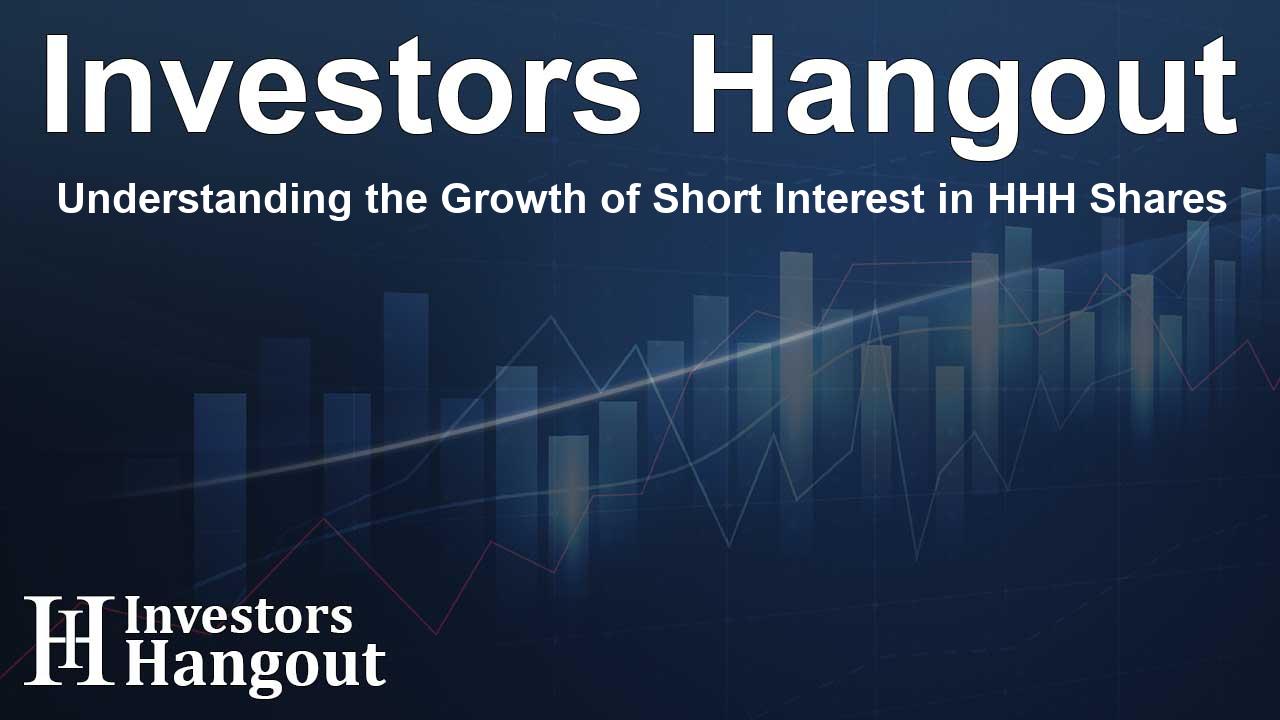Understanding the Growth of Short Interest in HHH Shares

Examining Short Interest in Howard Hughes Holdings
Howard Hughes Holdings, known by its ticker symbol HHH, has seen a notable increase in its short interest, with a reported rise of 28.76% since the last update. As of the latest figures, the company has 1.91 million shares sold short, which constitutes approximately 4.79% of all shares available for trading. This notable short interest ratio implies that it would require roughly 3.32 days for short-sellers to cover their positions, based on the average trading volume.
Why Monitoring Short Interest is Important
Short interest provides valuable insights into the market sentiment surrounding a stock. Essentially, it indicates the number of shares that have been sold short but have not yet been repurchased or closed out. In the context of investing, short selling is a strategy where traders sell shares they do not own, expecting the stock's price to decrease. If the price drops, these traders can buy back the shares at a lower cost, securing a profit. Conversely, if the stock price increases, short-sellers face potential losses.
Tracking short interest can serve as an important gauge for investor sentiment. An increase in short interest may suggest that investors are becoming bearish on a stock, while a decline can indicate a more bullish outlook. Understanding these dynamics helps traders navigate their investment strategies effectively.
Recent Trends in Short Interest for HHH
The latest data reveals that the percentage of shorted shares for Howard Hughes Holdings has grown since the previous report. This trend does not necessarily indicate an imminent decline in the stock's price; however, it suggests that more investors are positioning themselves in anticipation of potential downward price movements. This information is crucial for traders looking to make educated decisions based on current market conditions.
Comparative Analysis of Short Interest
To further understand Howard Hughes Holdings's performance, it is valuable to compare its short interest with that of its industry peers. A peer group typically includes companies within the same industry that share similar characteristics, such as size, financial structure, and market positioning. Analysts often refer to such comparisons to assess a company's relative performance.
Currently, the peer group average for short interest as a percentage of float within Howard Hughes Holdings's sector stands at 1.82%. This statistic indicates that HHH has significantly higher short interest than most of its competitors, which could imply stronger bearish sentiment among investors.
Implications of Rising Short Interest
Interestingly, an increase in short interest may not always be a negative indicator. In some scenarios, a higher short interest can lead to a short squeeze. This occurs when a heavily shorted stock's price begins to rise, forcing short-sellers to cover their positions, leading to even higher price increases. This phenomenon can create considerable volatility in the stock's price and present trading opportunities for investors.
Frequently Asked Questions
What is short interest in stocks?
Short interest refers to the number of shares that have been sold short but not yet covered. It serves as a measure of how many investors are betting against a stock.
Why does short interest matter to investors?
Short interest can provide insights into market sentiment and trends. High short interest may indicate bearish sentiment, while low short interest can suggest bullish attitudes among investors.
How can rising short interest impact a stock?
An increase in short interest can lead to increased volatility. If the stock price begins to rise, short-sellers may need to buy back shares to cover their positions, which can further drive the price up.
Is high short interest always bad for a stock?
No, high short interest can sometimes be a bullish signal. If a significantly shorted stock begins to rise, short-sellers may be forced to cover, creating a short squeeze.
What trades can be influenced by short interest data?
Traders often use short interest data to identify potential opportunities, such as short squeezes or to gauge overall market sentiment towards a company.
About The Author
Contact Caleb Price privately here. Or send an email with ATTN: Caleb Price as the subject to contact@investorshangout.com.
About Investors Hangout
Investors Hangout is a leading online stock forum for financial discussion and learning, offering a wide range of free tools and resources. It draws in traders of all levels, who exchange market knowledge, investigate trading tactics, and keep an eye on industry developments in real time. Featuring financial articles, stock message boards, quotes, charts, company profiles, and live news updates. Through cooperative learning and a wealth of informational resources, it helps users from novices creating their first portfolios to experts honing their techniques. Join Investors Hangout today: https://investorshangout.com/
The content of this article is based on factual, publicly available information and does not represent legal, financial, or investment advice. Investors Hangout does not offer financial advice, and the author is not a licensed financial advisor. Consult a qualified advisor before making any financial or investment decisions based on this article. This article should not be considered advice to purchase, sell, or hold any securities or other investments. If any of the material provided here is inaccurate, please contact us for corrections.
